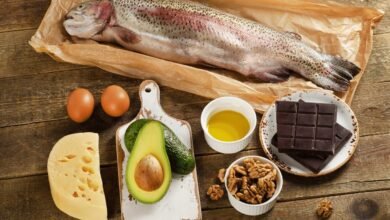Chronic Pain: Could a Dietary Approach Help?

Experiencing chronic pain on a daily basis imposes significant physical and mental strain. Although pain medication may be beneficial in managing chronic pain, a comprehensive and interdisciplinary approach should also incorporate lifestyle interventions.
Diet is one component that is frequently overlooked. A correlation exists between chronic pain and nutrition, which is a modifiable behavior that, according to the evidence, may aid in pain management. In fact, the foods that one consumes or abstains from may contribute to discomfort reduction. The following is essential information regarding chronic pain and diet.
Understanding Chronic Pain
Chronic pain can manifest in any anatomical region and persist for extended periods of time, spanning months to years. Chronic pain is defined by clinicians as discomfort that persists for a duration of three to six months and does not resolve spontaneously. Approximately 20% of adults in the United States suffered from chronic pain in 2019, according to a survey; 7.4% had high-impact chronic pain that restricted work and daily activities.
Read More : 8 Types of Heart Disease in Children and Teens
Arthritis, back and neck pain, cancer pain, migraines, pain originating from scar tissue, as well as muscle and nerve pain, are all instances of chronic pain. Chronic pain impedes daily activities and life substantially, and it has the potential to give rise to psychological disorders such as anxiety and depression.
Addressing the underlying cause of the discomfort constitutes the initial course of action. In situations where the aforementioned is unattainable or time-consuming, an alternative strategy involving dietary modifications, medication, and various therapeutic modalities may be implemented.
Chronic pain can manifest as a consequence of enduring injuries and illnesses. These factors induce physiological changes that heighten an individual’s sensitivity to pain. Experiencing chronic pain may cause you to experience discomfort, burning, stinging, or throbbing. You do not, however, have to live with it.
In addition to pharmacotherapy, a holistic approach encompassing nutrition, stress management, and psychotherapy can enhance the individual’s quality of life.
Exploring the Link Between Diet and Chronic Pain
According to scientific evidence, diet is a crucial component of any pain management regimen. Ultimately, comprehensive interventions that encompass nutrition as well as medication for chronic pain are more advantageous than those that solely concentrate on medication.Additionally, chronic pain is associated with increased body mass, the presence of multiple diseases or conditions, and a decline in dietary quality.
A person’s ability to shop, prepare meals, or stand, for instance, may be impaired if they experience discomfort or have limited mobility when doing so. Conversely, elevated levels of depression or isolation may result in reduced dietary consumption or increased comfort eating.
Additionally, a lack of outdoor time and decreased activity may result in the absence of thirst signals and dehydration. Lastly, sleep deprivation brought on by pain can lead to erratic eating patterns.
Conversely, there are numerous methods in which chronic pain can be alleviated through dietary optimization. Adequate consumption of macronutrients, vitamins, minerals, and antioxidants has the potential to improve the operation of the nervous, immune, and endocrine systems—all of which are involved in the regulation of pain perception.
Moreover, proper nutrition can aid in the prevention of additional chronic diseases and mitigate the severity of pre-existing conditions. Lastly, sustaining a healthy weight or losing weight may alleviate joint stress, thereby reducing chronic inflammation and pain.
What the Research Says
A substantial body of research supports the notion that diet plays a crucial role in the management of chronic pain. Chronic pain is frequently the consequence of a persistent proinflammatory state. Research indicates that the Western diet, which is predominantly composed of processed meat, refined cereals, sugary foods, and inadequate consumption of fruits and vegetables, is the primary source of pro-inflammatory properties.
The excessive production of interleukins, histamine, TNF-alpha, and free radicals is facilitated by this particular dietary pattern. Antioxidants and other anti-inflammatory mediators are also scarcer in the Western diet.
Low dietary intake of specific micronutrients, including omega-3 fatty acids, B vitamins, vitamin D, magnesium, and zinc, is correlated with chronic neuropathy and inflammatory pain, in addition to inflammation.6 It has been demonstrated that supplementation with these particular nutrients can alleviate migraines, joint pain caused by rheumatoid arthritis, and low back pain.
7 Disturbances between “good” and “bad” gut bacteria, or dysbiosis of the gut microbiome, may be factors in the development of irritable bowel syndrome and chronic abdominal discomfort. Increasing the consumption of prebiotics and probiotics may have a positive impact on the prevention and management of abdominal pain.
Over the course of the last decade, scientists have investigated the potential impacts of a ketogenic diet low in carbohydrates on neurological disorders, including Parkinson’s, Alzheimer’s, and multiple sclerosis. A ketogenic diet has the potential to enhance mitochondrial function, suppress oxidative stress, and inhibit inflammatory mediators, thereby increasing the activation of analgesic molecules in the central nervous system and reducing chronic pain associated with these factors.
Emerging research is also being conducted regarding the relationship between diet and migraine headache relief. 60 patients diagnosed with chronic migraines were divided into two groups for a placebo-controlled clinical trial employing a double-blind, randomized design. One group received omega-3 fatty acid supplements.
The number of days that the omega-3 group experienced migraines decreased after sixty days. Therefore, increasing omega-3 fatty acid consumption or consuming fatty fish more frequently may be beneficial in preventing migraines.
The effects of a plant-based diet on the management of chronic musculoskeletal pain were investigated in a second, minor study. For eight weeks, fourteen participants adhered to a plant-based diet. Participants received instruction concurrently from a physical therapist and registered dietitian. In conclusion, the research indicates that chronic pain may be effectively managed by physical therapists and registered dietitians working in tandem.
Foods That Can Help Alleviate Chronic Pain
There is a direct correlation between diet and the alleviation of chronic pain. Various dietary approaches, including plant-based and ketogenic diets, have been shown in studies to potentially contribute to pain management. To aid in pain reduction, consider incorporating the following foods into your daily diet immediately.
Whole Grains
Inflammation is a contributor to chronic pain; therefore, opting for whole grains over refined grains (oats, brown rice, quinoa, barley, buckwheat, spelt, and wheat) can help reduce this inflammatory response. Whole grains contain phenolic compounds that inhibit the synthesis of pro-inflammatory substances, whereas their dietary fiber promotes a healthy intestinal microbiome.
Moreover, whole grains are abundant in B vitamins, which have demonstrated efficacy in the management of pain related to neurological disorders and nerve injury.
Berries and Cherries
Cherries and berries are rich in phytonutrients and antioxidants, which reduce pain and inflammation. Additionally, they comprise anthocyanins, which function similarly to specific anti-inflammatory drugs in that they diminish inflammation within the body.
Fatty Fish
Salmon, tuna, haddock, and mackerel are oily fish that are rich in omega-3 fatty acids, which are potent anti-inflammatory nutrients. Furthermore, omega-3 fatty acids alleviate migraine pain and discomfort and alleviate muscle fatigue.
Broccoli
Sulforaphane, a chemical present in broccoli, targets the chemical mediators responsible for inducing inflammation within the body as a physiological response to stress. Phytonutrients and antioxidants, which are present in broccoli and other vegetables, aid in the reduction of oxidative stress.
Olive Oil
Olive oil contains oleocanthal in addition to being an exceptional source of anti-inflammatory monounsaturated fat. Oleocanthal functions in a manner analogous to that of anti-inflammatory drugs—it inhibits the pathway through which prostaglandins travel, thereby diminishing the inflammatory responses.
Ginger
The analgesic properties of ginger stem from its ability to inhibit prostaglandins, which are pro-inflammatory molecules. Ginger has been shown to be effective in reducing chronic low back pain, migraine pain, delayed-onset muscle fatigue, and osteoarthritis pain, according to a number of clinical trials.
Yogurt
Probiotics, which are abundant in yogurt, support and promote healthy gut flora. A healthy gut microbiome aids in the reduction of inflammation and abdominal pain, as well as the alleviation of gastroesophageal discomfort.
Avocado
Carotenoids, fiber, and anti-inflammatory monounsaturated lipids are all abundant in avocados. As antioxidants, carotenoids aid in the reduction of systemic inflammation.
Tips for Implementing Dietary Changes
To alleviate chronic pain through lifestyle modifications, start with some dietary adjustments. For instance, proceed by adding each item individually. Minor adjustments yield significant impacts and are more environmentally sustainable.
One can enhance their dietary intake of fruits and vegetables by incorporating frozen vegetables into pasta, stir-fries, or casseroles. Blend frozen berries with yogurt, frozen berries, or oatmeal. If you haven’t already, strive to consume fatty fish at least twice per week and sauté with olive oil. Consult a healthcare professional or registered dietitian regarding the use of an omega-3 fatty acid supplement if you dislike fish.
Read More: Everything about 1 terrible heath disease: Flu
Additionally, pain sensitivity can be heightened by dehydration, as water facilitates the circulation of nutrients that affect healing and pain. Aim for two to three liters of water daily and include bouillon, fruits, and vegetables in your diet as hydrating foods. Substitute whole grains for refined grains and minimize consumption of processed and sugary foods, which have the potential to exacerbate inflammation.
The role of diet in the reduction and management of chronic pain is substantial. According to research, optimal results are achieved with a holistic approach that incorporates nutrition, medication, and therapeutic interventions. Consistently consult your healthcare provider and contemplate seeking guidance from a registered dietitian for personalized recommendations and advice concerning food choices for pain management.











